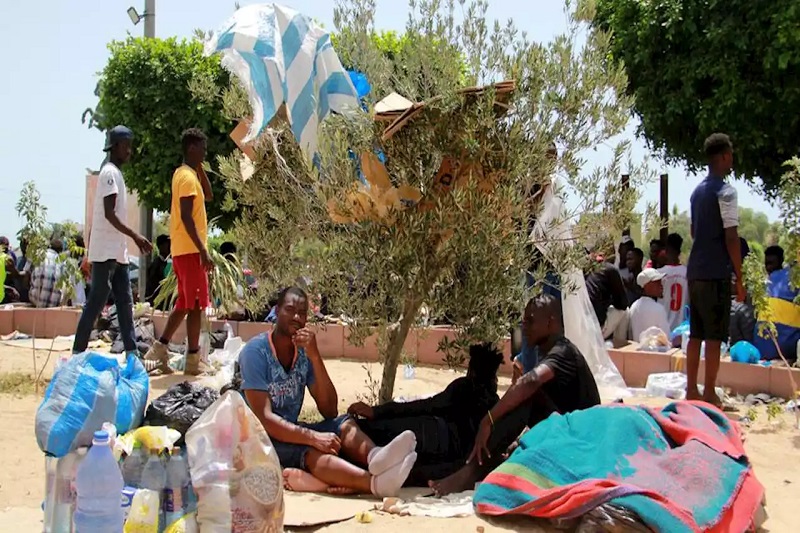Human Rights Watch issued a demand on Friday to the Tunisian government to stop what it referred to as the “collective expulsions” of black African migrants to a desert region close to the border with Libya. Since they were forced out of the port city of Sfax a week ago, hundreds of migrants from sub-Saharan Africa have been left stranded in the south of Tunisia in deplorable conditions. The situation is getting worse by the day.
The statement from the rights group comes in the wake of violence that occurred after the funeral of a 41-year-old Tunisian man who was stabbed to death in Sfax on Monday during a scuffle between Tunisians and migrants. Many people who wish to travel to Europe by water leave via Sfax, which is the second-largest city in the North African country. Their destination is typically the Italian island of Lampedusa, which is around 130 kilometers (80 miles) away.
Since July 2, HRW has reported that Tunisian security personnel have collectively sent several hundred Black African migrants and asylum seekers, including children and pregnant women, to a remote, militarized buffer zone along the border of Tunisia and Libya.
Related Posts
“Many reported violence by authorities during arrest or expulsion,” the watchdog based in New York stated in its statement. Lauren Seibert of Human Rights Watch (HRW) pleaded with the government of Tunisia to “stop collective expulsions and urgently enable humanitarian access to the African migrants and asylum seekers already expelled to a dangerous area.”
The organization asserted that migrants it had questioned claimed that “several people died or were killed at the border area” between Sunday and Wednesday, “some shot and others beaten” by Tunisian security forces. “They also said that Libyan men carrying machetes or other weapons had robbed some people and raped several women,” HRW reported, adding that it was unable to independently verify the accusations.
Human Rights Watch issued a call to action to the administration in Tunis, urging them to “investigate and hold to account security forces implicated in abuses.” “African migrants and asylum seekers, including children, are desperate to get out of the dangerous border zone and find food, medical care, and safety,” said Seibert. “The border zone is a hotbed for human trafficking.” “There is no time to waste.” “There is no opportunity to waste.”
After President Kais Saied made statements in February accusing “hordes” of undocumented migrants of bringing violence to Tunisia and asserting a “criminal plot” to change the demographic make-up of the country, the country has seen an increase in the number of attacks motivated by racism.
Several migrants who were carried against their will to the desert reported by phone on Thursday to AFP that hundreds of people, including women and children, had been abandoned there and forced to fend for themselves. An African group uploaded a video on Friday showing a large number of clearly exhausted people—including mothers with children—sitting or sleeping on the sand in the desert close to the Libyan border. A camera that was on the ground recorded the footage.
One of them implores the others for assistance, adding, “We have nothing to eat.” “How many days are we going to be able to make it?” A journalist working for AFP said that on Friday, hundreds of migrants gathered in a park in the city of Sfax to demand “peace and security.” “I am no longer safe because I do not have a place to reside and because I am homeless.” Abdelatif Farati, age 18, who has been living in Tunisia with his four brothers for the past four years, expressed his desire to return to Burkina Faso by saying, “I just want to go home.”
Placards made of cardboard with the words “Black lives matter” were held aloft throughout the demonstration. After being driven from their houses, some Tunisians have shown their support for the migrants by distributing food and offering medical assistance to those who are currently living on the street.
Ahmed Nejib Chebbi, the leader of Tunisia’s most prominent opposition alliance, referred to the events as “a black page in our history” on Friday. People are being detained solely on the basis of the color of their skin. This is an embarrassment, Chebbi stated to AFP.

